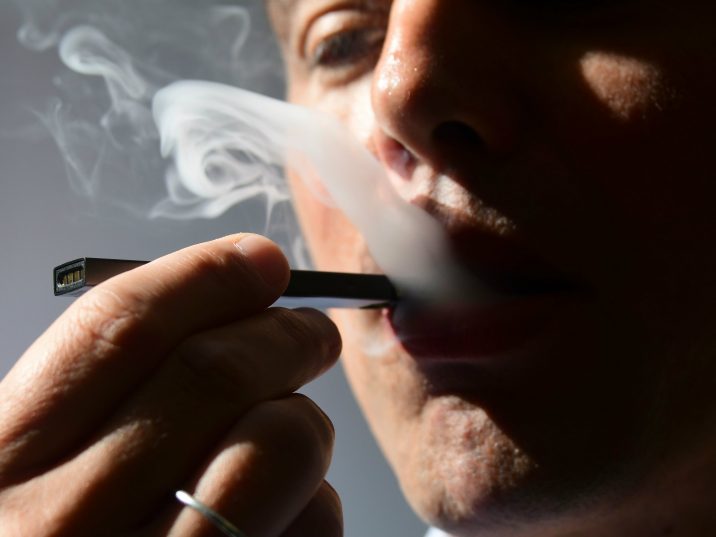You are here
Home 🌿 Recreational Marijuana News 🌿 Health crisis casts shadow over Canadian debut of Cannabis vapes 🌿Health crisis casts shadow over Canadian debut of Cannabis vapes

The vaping health crisis is happening at a very bad time for the Canadian cannabis industry.
With pot stocks already down over 40 percent since the end of the first quarter, news that an Ontario youth has been diagnosed with Canada’s first reported vaping-linked illness while hundreds have fallen ill in the U.S., is further battering the sector.
It’s not clear what’s causing the illnesses or whether they’re tied to nicotine, cannabis or both. As long as that uncertainty persists, so will questions about whether the big bets many Canadian pot companies have made on vaping will pay off.
Canada has taken a staggered approach to legalization, and the first legal cannabis vapes will appear on stores shelves along with edibles and beverages on Dec. 16. Pot companies are optimistic vapes will be the most popular format with consumers, and that they’ll help to boost flagging margins in an industry that’s struggling to become profitable.
Vaping accounts for 24 percent of the legal U.S. market, according to Cowen & Co. analyst Vivien Azer, and many companies are expecting it to take an even larger share of the Canadian market. Tim Pellerin, general manager of Canada for Pax Labs Inc., predicts Canadian vape sales could reach $600 million ($452 million) by 2021.
The illnesses haven’t dampened companies’ optimism, at least in public, but there is concern that sales could be more muted than expected if they continue.
“Market confusion is never good,” Mark Zekulin, chief executive officer at Canopy Growth Corp., told reporters after the company’s annual meeting in Toronto last week. “We’re seeing unknowns that people need and want answered.”
Tough regulations
Canada’s highly regulated market should provide assurance that legal vape products will be safe, Zekulin said.
That was echoed by Cam Battley, chief corporate officer at Aurora Cannabis Inc. “In Canada we’ve got perhaps the world’s most respected regulatory system with respect to cannabis,” Battley said in an interview. “That likely will give both patients and consumers confidence that any product that reaches the market will have gone through rigorous testing and will be compliant with all regulations.”
The impact on the market will come down to whether the cause of the illnesses is identified by Dec. 16, said Trina Fraser, partner at Brazeau Seller Law in Ottawa.
“If we can get to the bottom of what the root cause is and we can offer assurances to consumers that that ingredient is not used in cannabis vape pens in Canada, I don’t think it should have any effect on demand,” Fraser said. “If it is a more systemic problem and these products generally are an irritant or somehow a precipitant to lung disease, that would be devastating to the vape industry.”
It’s not just Canadian regulations that could impact Canadian cannabis companies. Cronos Group Inc., for example, is leveraging shareholder Altria Group Inc.’s expertise to develop vape products that could eventually be sold on both sides of the border. The Trump administration said on Sept. 11 it will move to take all flavoured e-cigarettes off the market within 30 days.
A U.S. ban on flavoured e-cigarettes would complicate Cronos’ plans, according to Bloomberg Intelligence analyst Kenneth Shea. “That’s because we believe the FDA’s toughened stance to reduce youth consumption of vaping products could extend to unflavoured and cannabinoid products too,” Shea wrote.
420 Intel is Your Source for Marijuana News
420 Intel Canada is your leading news source for the Canadian cannabis industry. Get the latest updates on Canadian cannabis stocks and developments on how Canada continues to be a major player in the worldwide recreational and medical cannabis industry.
420 Intel Canada is the Canadian Industry news outlet that will keep you updated on how these Canadian developments in recreational and medical marijuana will impact the country and the world. Our commitment is to bring you the most important cannabis news stories from across Canada every day of the week.
Marijuana industry news is a constant endeavor with new developments each day. For marijuana news across the True North, 420 Intel Canada promises to bring you quality, Canadian, cannabis industry news.
You can get 420 Intel news delivered directly to your inbox by signing up for our daily marijuana news, ensuring you’re always kept up to date on the ever-changing cannabis industry. To stay even better informed about marijuana legalization news follow us on Twitter, Facebook and LinkedIn.




